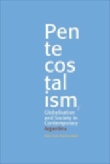Sökning: onr:20885324 > Pentecostalism, Glo...
- 1 av 1
- Föregående post
- Nästa post
- Till träfflistan
Pentecostalism, Globalisation and Society in Contemporary Argentina [Elektronisk resurs]
- Aasmundsen, Hans Geir, 1967- (författare)
- Kristenson, Olle (opponent)
- Södertörns högskola Institutionen för historia och samtidsstudier (utgivare)
- Publicerad: Huddinge : Södertörns högskola, 2013
- Engelska 237
- Serie: Södertörn Doctoral Dissertations, 1652-7399
- E-bokAvhandling(Diss. , 2013)
Sammanfattning
Ämnesord
Inställningar
Hjälp
Stäng
- In Argentina, Pentecostalism had a breakthrough in the early 1980s, and today more than 10 per cent of the population are Pentecostals. The revival coincided with a socio-political transformation of Argentinean society. After half a century of dictatorships and Peronism, democracy was restored, and structural changes paved the way for a certain “autonomisation” of politics, law, economy, science and religion. The "new" form of society that developed resembles what in this study is called a Western model, which to a large degree is currently being diffused on a global scale. This work examines the new religious sphere and how Pentecostals relate to society at large, and the political and judicial sphere in particular. Social systems theory and an idea of communication as constitutive of social spheres, such as religious, political and judicial ones, form the theoretical foundation for the study. Methods that have been used are fieldwork, interviews and analyses of written material. It is concluded that evangelisation and transformation are of major concern to Pentecostals in contemporary Argentina and that this follows a global trend. Evangelisation has always been important to, even a hallmark of, Pentecostalism. What has become as important is the urge for transformation, of the individual, the family and society. This leads to increased socio-political engagement. However, Pentecostals do not have a “fixed” idea of how society should be organised, i.e., they do not yet have a full-fledged political theology, a public theology or what could be called a Pentecostal ideology. This is mainly because they experience a lack of “compatibility” between the Pentecostal and the political communication. Their approaches to socio-political concerns seem to be based on an understanding of certain “values” as the fundamental building block of society.
Ämnesord
- Humanities and the Arts (ssif)
- Philosophy, Ethics and Religion (ssif)
- Religious Studies (ssif)
- Humaniora och konst (ssif)
- Filosofi, etik och religion (ssif)
- Religionsvetenskap (ssif)
- HUMANITIES and RELIGION (svep)
- Religion/Theology (svep)
- HUMANIORA och RELIGIONSVETENSKAP (svep)
- Religionsvetenskap/Teologi (svep)
Genre
- government publication (marcgt)
Indexterm och SAB-rubrik
- Argentina
- globalisation
- Pentecostalism
- society
- politics
- evangelisation
- religious freedom
- equality
Titeln finns på 2 bibliotek.
Bibliotek i Stockholmsregionen (1)
Ange som favorit- Kungliga Tekniska högskolan, E-resurser (Tdig)Ange som favorit
- Bibliotekets lokala katalog
-
- Läs hela (Online access for KTHB) (fulltext) (Free eBooks: Nordic countries)
Bibliotek i västra Sverige (1)
Ange som favorit- Högskolan i Halmstad, E-resurser (Hald)Ange som favorit
- Bibliotekets lokala katalogCheck local availability
-
- Läs hela (Tillgänglig för användare inom Högskolan i Halmstad) (fulltext) (Standalone portfolio)
- 1 av 1
- Föregående post
- Nästa post
- Till träfflistan
Sök vidare
Hjälp
- Fler titlar av
- Aasmundsen, Hans Gei ...
- Kristenson, Olle
- Södertörns högskola ...
- Fler titlar om
- Humanities and the A ...
- Philosophy, Ethics a ...
- Religious Studies
- Humaniora och konst
- Filosofi, etik och r ...
- Religionsvetenskap
- visa fler...
- HUMANITIES and RELIG ...
- Religion/Theology
- HUMANIORA och RELIGI ...
- Religionsvetenskap/T ...
- visa färre...
- Fler titlar i denna genre
- government publicati ...
- Serie
- Fler delar
- channel record
- Fler delar
Sök utanför LIBRIS
Hjälp
- Sök vidare i:
- Google Book Search
- Google Scholar
- LibraryThing
Kungliga biblioteket hanterar dina personuppgifter i enlighet med EU:s dataskyddsförordning (2018), GDPR. Läs mer om hur det funkar här.
Så här hanterar KB dina uppgifter vid användning av denna tjänst.
Copyright © LIBRIS - Nationella bibliotekssystem

